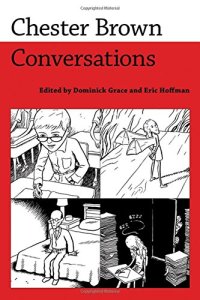
Ebook: Chester Brown: Conversations
- Tags: Artists Architects & Photographers, Arts & Literature, Biographies & Memoirs, History & Price Guides, Comics & Graphic Novels, Humor & Entertainment, Humor, Movies, Performing Arts, Pop Culture, Puzzles & Games, Radio, Sheet Music & Scores, Television, Trivia & Fun Facts, Comics & Graphic Novels, Genres & Styles, History & Criticism, Literature & Fiction, Canadian, World Literature, Literature & Fiction
- Series: Conversations with Comic Artists Series
- Year: 2013
- Publisher: University Press of Mississippi
- Language: English
- pdf
The early 1980s saw a revolution in mainstream comics―in subject matter, artistic integrity, and creators’ rights―as new methods of publishing and distribution broadened the possibilities. Among those artists utilizing these new methods, Chester Brown (b. 1960) quickly developed a cult following due to the undeniable quality and originality of his Yummy Fur (1983–1994).
Chester Brown: Conversations collects interviews covering all facets of the cartoonist’s long career and includes several pieces from now-defunct periodicals and fanzines. It also includes original annotations from Chester Brown, provided especially for this book, in which he adds context, second thoughts, and other valuable insights into the interviews. Brown was among a new generation of artists whose work dealt with decidedly nonmainstream subjects. By the 1980s comics were, to quote a by-now well-worn phrase, “not just for kids anymore,” and subsequent censorious attacks by parents concerned about the more salacious material being published by the major publishers―subjects that routinely included adult language, realistic violence, drug use, and sexual content―began to roil the industry. Yummy Fur came of age during this storm and its often-offensive content, including dismembered, talking penises, led to controversy and censorship.
With Brown’s highly unconventional adaptations of the Gospels, and such comics memoirs as The Playboy (1991/1992) and I Never Liked You (1991–1994), Brown gradually moved away from the surrealistic, humor oriented strips toward autobiographical material far more restrained and elegiac in tone than his earlier strips. This work was followed by Louis Riel (1999–2003), Brown’s critically acclaimed comic book biography of the controversial nineteenth-century Canadian revolutionary, and Paying for It (2011), his best-selling memoir on the life of a john.